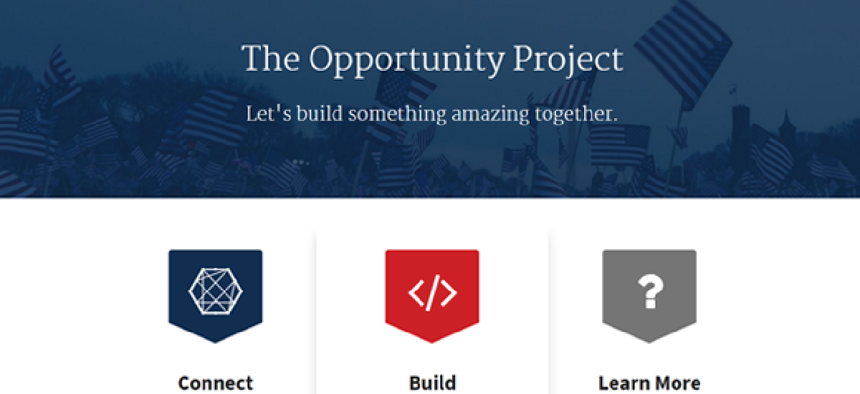White House launches open data Opportunity Project

The package of open data and digital tools will help developers build apps that tackle inequities and strengthen communities.
The White House’s new open data initiative, the Opportunity Project, aims to improve economic mobility for citizens with the release of federal and local datasets and easy-to-use digital tools.
The Opportunity Project launched March 7 in conjunction with the Census Bureau’s release of its Opportunity.Census.gov platform, which allows developers, community groups and local governments to build or use tools for finding jobs, housing, transportation, schools and neighborhood amenities.
The site includes health, commercial and agricultural datasets from federal agencies, as well as publically available data generated primarily by the Census Bureau’s American Community Survey. Local datasets were supplied by Baltimore; Detroit; Kansas City, Mo.; New Orleans; New York; Philadelphia; San Francisco; and Washington, D.C.
The Census Bureau also worked with Presidential Innovation Fellows to create a new Opportunity module for the open-source City Software Development Kit -- a resource that helps software developers use Opportunity Project data to build products.
In addition to the data, private-sector partners like Redfin, Zillow, GreatSchools, PolicyLink and Streetwyze contributed tools to help citizens find opportunities in housing, education, employment and community resources.
One of the tools created using the opportunity data inventory is Redfin’s Opportunity Score, which combines jobs data from the Department of Commerce with Redfin’s transit score network to show users jobs accessible without a car. Users simply type in an address, see the opportunity score of that area, transit options and even the home prices around it, Redfin researcher Eric Scharnhorst explained at the briefing.
The PolicyMap tool, for example, helps families in Philadelphia find housing based on their own ranked criteria, such a strong housing market near a good school with access to transit. Designed by Reinvestment Fund, PolicyMap draws from 19 public datasets, including the American Community Survey, the Housing and Urban Development’s School Proficiency Index, hospital location data, locations of retailers that accept Supplemental Nutrition Assistance Program benefits, school data from the National Center for Education Statistics and transit data from the Southeastern Pennsylvania Transpiration Authority, according to PolicyMap’s Maggie McCullough.
Companies like Esri and Socrata are incorporating Opportunity Project data into their own platforms as well. With the Open Opportunity Data inventory, Census Bureau data and HUD data on jobs, education, transportation and labor markets, Esri built an ArcGIS tool that shows areas of opportunity for low-income citizens with children, according to Esri. Socrata will now allow include Opportunity Project data in its nationwide Open Data Network, normalizing and optimizing it for search engines so the data is easy to discover.
The Opportunity Project “represents a new way that the federal government is collaborating with local leaders, technologists, non-profits, the private sector and community members to really expand the access to data and provide access to opportunities and to fair housing across the country,” said John Thompson, Census Bureau director, during a White House briefing March 7.
Along with these participating companies, more than 30 additional non-profits, community organizations, coding boot camps, academic institutions and local governments have also committed to using Opportunity Project data.
NEXT STORY: Communications tool connects radio, IP networks





